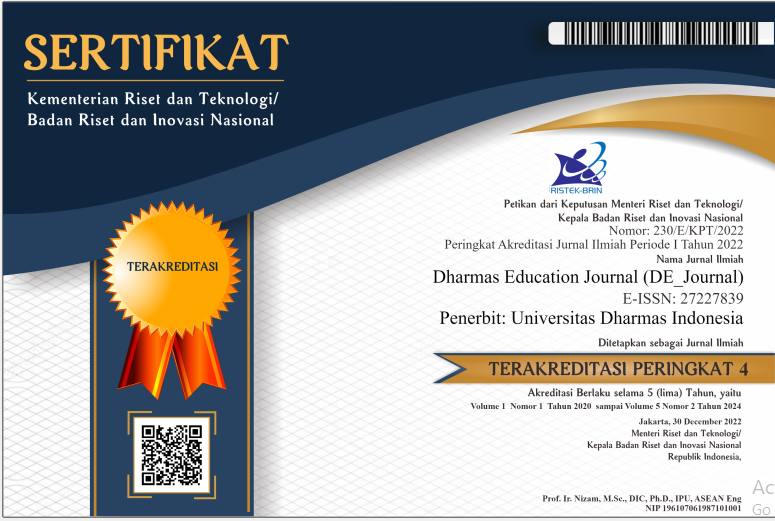HUBUNGAN KECERDASAN SPIRITUAL, EMOSIONAL, DAN INTENSITAS PEMBINAAN DENGAN KEBIASAAN BERPIKIR REFLEKTIF GURU DALAM MENGATASI MASALAH SISWA
DOI:
https://doi.org/10.56667/dejournal.v5i1.1313Keywords:
Spiritual Intelligence, Emotional, Coaching Intensity, Reflective Thinking Habits, Teachers, Student ProblemsAbstract
This study was conducted to measure the level of relationship between spiritual intelligence (X1), emotional intelligence (X2) and coaching intensity (X3) with teachers' reflective thinking habits in overcoming student problems (Y), both simultaneously and simultaneously. This study uses quantitative correlational methods with survey techniques. The sample was determined using the Slovin formula with an error allowance of 5%, so that a sample size of 125 people was obtained from a population of 181 teachers. To obtain data, a questionnaire instrument was used whose validity and reliability values have been tested. The results of the research show that: (1) there is a strong positive relationship between spiritual intelligence and teachers' reflective thinking habits in dealing with student problems, based on the value of ry.1 = 0.562 > rtable (rttable = 0.176 at α = 0.05 and rtable = 0.230 at α = 0.01). (2) there is a strong positive relationship between emotional intelligence and teachers' reflective thinking habits in dealing with student problems, based on the value of ry.1 = 0.594 > r table (rt table = 0.176 at α = 0.05 and r table = 0.230 at α = 0.01 ). (3) there is a strong positive relationship between coaching intensity and teachers' reflective thinking habits in dealing with student problems, based on the value of ry.1 = 0.643 > rtable (rttable = 0.176 at α = 0.05 and rtable = 0.230 at α = 0.01 ). (4) there is a strong positive relationship between spiritual intelligence, emotional intelligence and coaching intensity simultaneously with the teacher's reflective thinking habits in dealing with student problems, based on the value of ry.1 = 0.701 > r table (rt table = 0.176 at α = 0.05 and r table = 0.230 at α = 0.01).
Downloads
References
Afandi, M. (2014). PENTINGNYA PENELITIAN TINDAKAN KELAS BAGI GURU DALAM PEMBELAJARAN DI SEKOLAH DASAR. Jurnal Ilmiah Pendidikan Dasar, 1(1), 1. https://doi.org/10.30659/pendas.1.1.1-19
Alwi, S. (2008). Manajemen Sumber Daya Manusia (kedua). Yogyakarta: BPFEYogyakarta.
Cahyani, A. (2021, July 8). 7 Alasan Mengapa Guru Perlu Memiliki Kemampuan Reflektif. Blog Kejar Cita. https://blog.kejarcita.id/7-alasan-mengapa-guru-perlu-memiliki-kemampuan-reflektif/
Cudeck, R. (2012). Book Reviews : Kenneth D. Hopkins and Gene V. Glass Basic Statistics for the Behavioral Sciences. Englewood Cliffs, New Jersey: Prentice-Hall, 1978. Pp. xii + 436. Educational and Psychological Measurement, 39(2), 519–521. https://doi.org/10.1177/001316447903900240
Hazim, N. (2015). Teknologi Pembelajaran. Jakarta: UT PUSTEKOMIPTPI.
Kharisma, Elina. A. (2018, March 11). Sudah Saatnya Guru Berpikir Reflektif. Kompasiana. https://www.kompasiana.com/elina_kharisma/5aa4efdb5e137329ac5b09d4/sudah-saatnya-guru-berpikir-reflektif
Lickona, T. (2013). Educating for Character: How Our School Can Teach Respect and Responsibility.
Livesey, P. V. (2017). Goleman-Boyatzis Model of Emotional Intelligence for Dealing with Problems in Project Management. Construction Economics and Building, 17(1), 20–45. https://doi.org/10.5130/AJCEB.v17i1.5101
Manurung, S. Y., & Listiani, T. (2020). Menjadi Guru Yang Reflektif Melalui Proses Berpikir Reflektif Dalam Pembelajaran Matematika (Becoming A Reflective Teacher Through The Reflective Thinking Process In Mathematics Learning). Polyglot: Jurnal Ilmiah, 16(1), 58. https://doi.org/10.19166/pji.v16i1.2262
Mashlow, A. H. (2013). A Theory Human Motivasion. Midwest Journal Press.
Muis, T., Syafiq, M., & Savira, S. I. (2011). Bentuk, Penyebab, Dan Dampak Dari Tindak Kekerasan Guru Terhadap Siswa Dalam Interaksi Belajar Mengajar Dari Perspektif Siswa Di Smpn Kota Surabaya: Sebuah Survey. Jurnal Psikologi Teori Dan Terapan, 1(2), 63. https://doi.org/10.26740/jptt.v1n2.p63-74
Rakhman, F., & Surur, M. (2024). Analysis of the Readiness of Driving School Teachers in Implementing the Independent Curriculum at the PAUD Level in Situbondo Regency. Journal of Adulearn World Al-Hijr: Journal of Adulearn World, 3(1). https://doi.org/10.55849/alhijr.v3i1.569
Rinjani, H., & Firmanto, A. (2013). Kebutuhan Afiliasi dengan Intesitas Mengakses Facebook pada Remaja (Vol. 01, Issue 01). www.checkfacebook.com
Rochanah, S. (2018). Management Of Character Leadership Student Leadership In Secondary Middle School Nsq City Cirebon (Vol. 5, Issue 1). http://journal.unj.ac.id/unj/index.php/ijer
Salovey, P. (2003). Emotional Intelligence: Conceptualization and Measurement. In Blackwell Handbook of Social Psychology: Interpersonal Processes (pp. 279–307). Wiley. https://doi.org/10.1002/9780470998557.ch11
Setiawan, Y., Wijaya, A., Surur, M., & Dassucik, D. (2024). Pengaruh Pembelajaran Kolaboratif Terhadap Keterampilan Pemecaahan Masalah Siswa SMK Negeri 1 Kendit. Jurnal Kajian Penelitian Pendidikan Dan Kebudayaan (JKPPK), 2(2). https://doi.org/10.59031/jkppk.v2i2.315
Surur, M., Wiranata, R., & Aisyah, S. (2023). Pengaruh profesionalisme dan sertifikasi terhadap kinerja guru mata pelajaran IPS di SMP Negeri Se-Kabupaten Lumajang. https://doi.org/10.25273/equilibrium.y11i2.17368
Tri Wahyuni, F. (2018). Berpikir Reflektif Dalam Pemecahan Masalah Pecahan Ditinjau Dari Kemampuan Awal Tinggi dan Gender. JURNAL PENDIDIKAN MATEMATIKA (KUDUS), 1(1). https://doi.org/10.21043/jpm.v1i1.4455
Utami, A. W. (2015). Studi Mengenai Tindak Kekerasan Verbal dan Nonverbal oleh Guru terhadap Siswa SMA Negeri di Surakarta Tahun Ajaran 2014/2015. Sosialitas: Jurnal Ilmiah Pendidikan Sosiologi-Antropologi.
Zohar D., & M. I. (2007). SQ- Kecerdasan Spiritual . PT Mizan Pustaka.
Downloads
Published
How to Cite
Issue
Section
License
Copyright (c) 2024 Dharmas Education Journal (DE_Journal)

This work is licensed under a Creative Commons Attribution-NonCommercial-NoDerivatives 4.0 International License.
Makalah yang disampaikan diasumsikan tidak mengandung bahan propietary yang tidak dilindungi oleh hak paten














